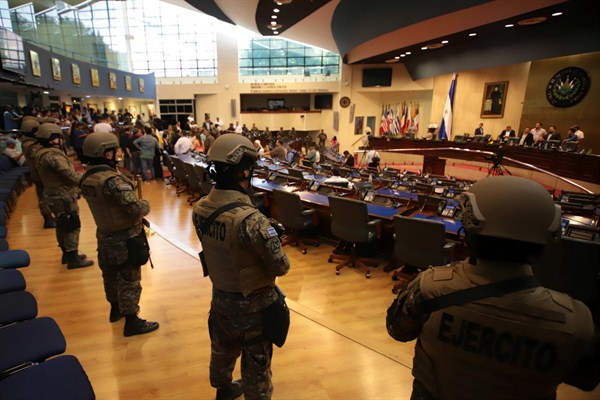In a blatant display of disregard for the country’s democratic institutions, President Nayib Bukele ordered the military to briefly occupy El Salvador’s legislature last weekend. He was apparently irritated with the slow pace of legislative negotiations over his proposal for a $109 million loan from a regional development bank to pay for new military equipment, as part of a broader crime bill. Bukele’s supporters applauded the show of force, but it provoked an outcry from critics concerned about the 38-year-old president’s disdain for the rule of law and his willingness to politicize the military.
Bukele argues that the loan from the Central American Bank for Economic Integration is crucial to help security forces confront El Salvador’s violent gangs. Last week, frustrated with requests from legislators for more details about how the money would be spent, he announced that he would invoke Article 167 of the constitution, which allows the executive branch to convene a special session of the Legislative Assembly. Legislators, Bukele said, would be required to hold a vote to approve the loan on Sunday at 3 p.m. Opposition lawmakers argued that Article 167 was reserved for national emergencies, and that Bukele had no authority to trigger it under these circumstances. Members of the main conservative opposition party, the Nationalist Republican Alliance, or ARENA, even called the move an “auto-golpe,” or self-coup. Instead, opposition legislators scheduled a plenary vote on the loan for Monday.
Rebuffed, Bukele called on his supporters to gather in front of the Legislative Assembly on Sunday. Shortly before the 3 p.m. deadline, heavily armed troops entered the building, and Bukele addressed a crowd of cheering fans. One young Salvadoran who witnessed the armed soldiers guarding the legislature’s perimeter told me later in a WhatsApp message, “I never believed I could see something like this.” Bukele spoke of the “people’s right to insurrection,” which is guaranteed in another article of El Salvador’s constitution, and threatened to remove uncooperative lawmakers, while pausing at one point to take a selfie with the crowd. It was pure populism of the sort that brought him to power. His historic victory in last February’s elections was propelled by an anti-corruption platform and heavy reliance on social media to control his messaging. Immensely distrustful of the media, Bukele has preferred to communicate directly with the public through his Facebook and Twitter accounts.

